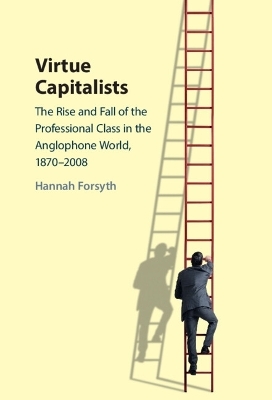
Virtue Capitalists
The Rise and Fall of the Professional Class in the Anglophone World, 1870–2008
Seiten
2023
Cambridge University Press (Verlag)
978-1-009-20648-8 (ISBN)
Cambridge University Press (Verlag)
978-1-009-20648-8 (ISBN)
Forsyth examines the rise of the professional middle class in the Anglophone world from c. 1870 to 2008. She argues that the British middle class structured forms of virtue into expanding white-collar professional work, needed to drive both economic and civilizational expansion across the US, Australia, Canada and New Zealand.
Virtue Capitalists explores the rise of the professional middle class across the Anglophone world from c. 1870 to 2008. With a focus on British settler colonies – Canada, Australia, New Zealand and the United States – Hannah Forsyth argues that the British middle class structured old forms of virtue into rapidly expanding white-collar professional work, needed to drive both economic and civilizational expansion across their settler colonies. They invested that virtue to produce social and economic profit. This virtue became embedded in the networked Anglophone economy so that, by the mid twentieth century, the professional class ruled the world in alliance with managers whose resources enabled the implementation of virtuous strategies. Since morality and capital had become materially entangled, the 1970s economic crisis also presented a moral crisis for all professions, beginning a process whereby the interests of expert and managerial workers separated and began to actively compete.
Virtue Capitalists explores the rise of the professional middle class across the Anglophone world from c. 1870 to 2008. With a focus on British settler colonies – Canada, Australia, New Zealand and the United States – Hannah Forsyth argues that the British middle class structured old forms of virtue into rapidly expanding white-collar professional work, needed to drive both economic and civilizational expansion across their settler colonies. They invested that virtue to produce social and economic profit. This virtue became embedded in the networked Anglophone economy so that, by the mid twentieth century, the professional class ruled the world in alliance with managers whose resources enabled the implementation of virtuous strategies. Since morality and capital had become materially entangled, the 1970s economic crisis also presented a moral crisis for all professions, beginning a process whereby the interests of expert and managerial workers separated and began to actively compete.
Hannah Forsyth is a historian at the Australian Catholic University, Sydney. She was President of Australian and New Zealand History of Education Society 2020-1. Her first book was A History of the Modern Australian University (2014).
1. Introduction: capitalism, class, and virtue; Part I. Professionalizing the Anglo Economy, c.1870-1945: 2. Civilizing capitalism; 3. Achieving class; 4. From bourgeois to professional; Part II. Managing the Global Economy, c.1945–1975; 5. Angels of the state; 6. Classy work; Part III. The New Class Conflict c.1975–2008: 7. Moral crisis; 8. Success is the only virtue; Epilogue: contours of the new class conflict.
| Erscheinungsdatum | 09.09.2023 |
|---|---|
| Zusatzinfo | Worked examples or Exercises |
| Verlagsort | Cambridge |
| Sprache | englisch |
| Maße | 158 x 235 mm |
| Gewicht | 580 g |
| Themenwelt | Geschichte ► Teilgebiete der Geschichte ► Wirtschaftsgeschichte |
| Wirtschaft ► Volkswirtschaftslehre | |
| ISBN-10 | 1-009-20648-6 / 1009206486 |
| ISBN-13 | 978-1-009-20648-8 / 9781009206488 |
| Zustand | Neuware |
| Haben Sie eine Frage zum Produkt? |
Mehr entdecken
aus dem Bereich
aus dem Bereich
Macht und Herrschaft im Zarenreich
Buch | Hardcover (2024)
C.H.Beck (Verlag)
49,90 €


